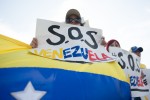A group of about 400 people, including UCLA students, protested in Westwood Saturday what they believe are shortcomings of the Venezuelan government that have led to supply shortages, violence and suppression of protests in the country.
Many waved Venezuelan flags, sang the country’s national anthem and cheered amid a symphony of horns honking in support.
“We’re trying to (protest) peacefully,” said Francisco Mier y Terán, a third-year civil engineering student.
Because protesters in Venezuela have been branded as violent, protesters wear white to symbolize their commitment to peaceful anti-Venezuelan government demonstrations worldwide.
Thousands of Venezuelans are protesting corruption, inflation, food scarcity and systemic violence in the country. Leopoldo López – former mayor of a rich borough of the capital, Caracas, and member of the Popular Will party – is the opposition leader.
Rallies largely composed of women also have taken place in Venezuela supporting President Nicolas Maduro in reaction to the opposition protests. Maduro has claimed that the protesters are groups of subversive ideologues including fascists who are trying to remove him from power in a coup.
Protests in Venezuela escalated on Feb. 12, National Youth Day in Venezuela, when three people were killed in clashes between pro-government supporters, anti-government protesters and police who followed major rallies.
Valentina Romero, an organizer of Saturday’s Westwood protest, said the demonstration was held in solidarity with the anti-government protests in Venezuela so people outside the country can learn about them. Many of the people at the protest Saturday have lived in the U.S. for years, but their connection to their country remains strong, Romero said.
Mier y Terán, who is Venezuelan and called himself a member of the opposition, said he wants to inform the American public about the crisis. Even though there are only a handful of Venezuelans at UCLA, he said, people should know about the problems facing Venezuela and the demonstrators.
Fabiola Perez, a third-year communication studies student who participated in the demonstration and is Venezuelan, carried a sign with pictures of her friend who she said was arrested and beaten by police in Venezuela. Perez cannot be in Venezuela to help promote peace and political reform but wants to spread the word to the public so people can start thinking about ways to help, she said.
Perez said that she joined the demonstration because she feels frustrated and helpless about the crisis. She said she worries about friends and family in the country who are suffering from food and supply shortages, violence and arrest.
Perez said her grandparents live in the Venezuelan city of Merida, which is about 320 miles southwest of Caracas, and face food and supply shortages. They lack milk and toilet paper and have to stock up when they find them in stores.
Many of her family members and friends in Venezuela who are participating in the protests have experienced the crime, such as robberies, they are protesting, Perez said.
Maduro has called on the U.S., which he thinks has been an instigator, to engage in talks over the protests. U.S. officials have denied involvement.
“Even though we’ve been (in the U.S.) for however many years, we still care about what is going on (in Venezuela). … It’s from the heart,” Romero said.
The death toll stood at 10 on Saturday with casualties on both sides.
